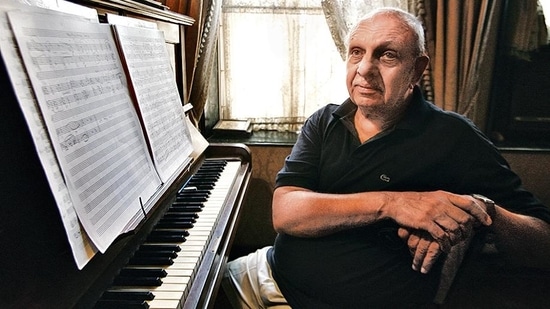Vanraj Bhatia, musician whose jingles were the soundtrack of ’80s, '90s, dies
The music director, who died on Friday aged 93, had already made a mark in Shyam Benegal’s films. Most notable were his songs Mero Gaam Katha Parey in Manthan (1976), Tumhare Bin Jee Na Lage in Bhumika (1977) and Kya Hai Tera Gham Bata in Kalyug (1981).
Cable television was yet to arrive, and Doordarshan ruled. Through much of the 1980s, home entertainment meant watching Sunday feature films or teleserials, interspersed with a series of 30- or 60-second ads. It was in these bursts that most of India encountered Vanraj Bhatia’s genius.

The music director, who died on Friday aged 93, had already made a mark in Shyam Benegal’s films. Most notable were his songs Mero Gaam Katha Parey in Manthan (1976), Tumhare Bin Jee Na Lage in Bhumika (1977) and Kya Hai Tera Gham Bata in Kalyug (1981). In fact, Mero Gaam… was even used to advertise Amul milk in 1976.
The 1980s saw Bhatia return in a big way to jingles, where he had begun his career, and to television serials. In switching between parallel cinema, advertising and TV programmes, he became one of the men who gave us the soundtrack of the 1980s.
In an interview with this writer, Bhatia once said, “In jingles, you get only 10 or 15 seconds to make an impact musically, unlike film songs which are three of four minutes long.” His most impactful jingle was perhaps the one he composed for the Liril ad, created by Lintas chief Alyque Padamsee with executive Neena Merchant. Featuring model Karen Lunel under a waterfall, its theme music was the still-used-in-snatches “La lalalalala” tune. It was made up of less than 20 notes, but it was fresh, youthful, and it still takes you straight back to the ’80s when you hear it.
The other big name composing jingles at the time was Louis Banks, who began with the Four Square cigarette commercial and later tasted huge success with his Hamara Bajaj and Cadbury’s tunes. These short films were initially made for viewing in cinema halls, but with many people buying colour TV sets after the 1982 Asian Games, the focus shifted to the small screen. Bhatia was quick to adapt, and composed successful jingles for Dulux, Tata Salt and Garden Vareli, the last of which was composed in Raag Desh.
Simultaneously, with Doordarshan looking for more content, many music directors got opportunities. Bhatia composed for Shridhar Kshirsagar’s Khandaan and Benegal’s travel-based series Yatra. In Govind Nihalani’s Tamas, set during Partition, the theme music has the chanting of “O rabba”. Bhatia recalled, “I received a National Award for it. I did everything except the gurdwara song. In fact, it was jury head Salil Chowdhury who insisted I should get the award when most other jury members felt I shouldn’t be given one because it was a television score.”
In Benegal’s historical series Bharat Ek Khoj, based on Jawaharlal Nehru’s book The Discovery of India, he used a hymn from the Rig Veda. It was well-received, and it spurred his interest in spiritual music. He later recorded albums based on the Upanishads and the Bhagavad Gita.
Bhatia’s last major project was the opera Agni Varsha, based on a Girish Karnad play. “That was always a dream project, and when I stopped all other projects, I would spend three hours a day on the opera. It required a completely different approach,” he said.
The composer was ailing for three years, and was undergoing financial difficulties. Musicians and well-wishers came out in support to help fund his medical treatment. He passed away at his residence in Mumbai, leaving behind a legacy of music that was pure, enriching and memorable.






